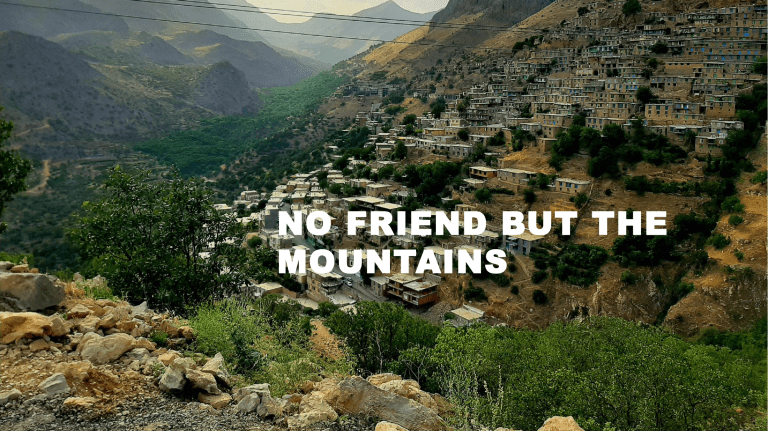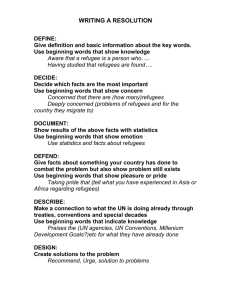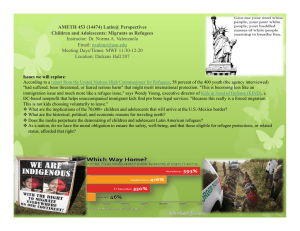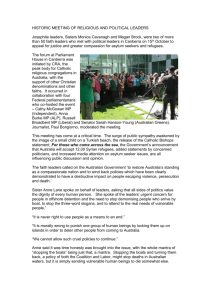
NO FRIEND BUT THE MOUNTAINS CONTEXT Behrouz Boochani Iran Kurdish people Asylum seekers Australian migration policy Manus Island BEHROUZ BOOCHANI • Iranian Kurdish • Holds a Masters degree in political science, political geography and geopolitics • Writer, journalist, scholar, cultural advocate and filmmaker • Co-founded a Kurdish magazine • Fled Iran in 2013 IRAN • One of the worlds oldest civilisations • Persia (until 1935) • Made up of different ethnic, religious and linguistic groups • Rich in gas/oil/petroleum (second-largest natural gas supply and the third-largest oil reserves) • Revolution in 1979, resulting in a change of government (Monarchy to Islamic theocracy) KURDISH IRANIANS • Ethnic group spanning Turkey, Iran, Syria and Iraq • 10% of Iranian population • 30 and 45 million • Speak Kurdish • Some practice other religions • Want independence ASYLUM SEEKERS Asylum seeker – someone looking for protection because they fear persecution, or have experienced persecution/violence/violations of human rights. Refugee – someone who has asked for protection and has been given refugee status Not all asylum seekers become refugees, but all refugees start as asylum seekers CONVENTION RELATING TO THE STATUS OF REFUGEES (CRSR) • United Nations treaty • Most countries have signed this • Sets out rights and responsibilities of both refugees and the country CONVENTION RELATING TO THE STATUS OF REFUGEES (CRSR) • provide free access to courts for refugees (Article 16) • provide administrative assistance for refugees (Article 25) • provide identity papers for refugees (Article 27) • provide travel documents for refugees (Article 28) • provide the possibility of assimilation and naturalization to refugees (Article 34) Refugees shall be treated at least like nationals in relation to • freedom to practice their religion (Article 4) • elementary education (Article 22) • public relief and assistance (Article 23) • labour legislation and social security (Article 24) • the right to free movement and free choice of residence within the country (Article 26) CONVENTION RELATING TO THE STATUS OF REFUGEES (CRSR) The contracting states shall not • discriminate against refugees (Article 3) • take exceptional measures against a refugee solely on account of his or her nationality (Article 8) • impose penalties on refugees who entered illegally in search of asylum if they present themselves without delay (Article 31), which is commonly interpreted to mean that their unlawful entry and presence ought not to be prosecuted at all[19] • expel refugees (Article 32) • forcibly return or "refoul" refugees to the country they have fled from (Article 33). The principle of non-refoulement is considered customary international law, so even states not party to the CRSR are required to abide by it. CONVENTION RELATING TO THE STATUS OF REFUGEES (CRSR) Definition of a refugee “As a result of events occurring before 1 January 1951 and owing to well-founded fear of being persecuted for reasons of race, religion, nationality, membership of a particular social group or political opinion, is outside the country of his nationality and is unable, or owing to such fear, is unwilling to avail himself of the protection of that country; or who, not having a nationality and being outside the country of his former habitual residence as a result of such events, is unable or, owing to such fear, is unwilling to return to it.” (CRSR) Article 33 – the principle of non-refoulement “No Contracting State shall expel or return (“refouler”) a refugee in any manner whatsoever to the frontiers of territories where his life or freedom would be threatened on account of his race, religion, nationality, membership of a particular social group or political opinion.” (CRSR) Presentation title 11 WHAT DO YOU KNOW ABOUT IMMIGRATION IN AUSTRALIA?* *Please stop me talking AUSTRALIAN REFUGEE POLICY • Australia accepts a certain quota of refugees per year • Refugee status verified by the UNHCR • In 2018 there were 25.9 million refugees worldwide AUSTRALIAN IMMIGRATION POLICY • Stricter policies introduced from 1990s • Offshore processing • Tampa affair (August 2001) • Children overboard incident (October 2001) AUSTRALIAN IMMIGRATION POLICY • ‘Pacific Solution’. (2001 – 2008) This included the excision of many of Australia’s offshore islands, including Christmas Island, from Australia’s migration zone. AUSTRALIAN IMMIGRATION POLICY • Operation Sovereign Borders (2013) The operation has implemented a "zero tolerance" posture towards what it has termed "Illegal Maritime Arrivals“ • People arriving in Australia sent to processing centres on Nauru and Papua New Guinea for their refugee claims to be processed and decided. They are detained while their claim is processed. AUSTRALIAN IMMIGRATION POLICY 207 arrivals in November 2013, compared with 20629 in November 2012 MANUS ISLAND DETENTION CENTRE • • • • • • • Housed on PNG Paid for by Australia Built to house 500 people At peak, houses 1,233 people (2014) Australian run by security forces Riot 2014 Closed in 2017 - PNG government found it ‘unconstitutional’, ruling detention of asylum seekers and refuges was illegal • In total, 13 people detained by Australia in PNG and Nauru have died from violence, medical inattention and suicide AUDIENCE & PURPOSE Who has this book been written for? Why was it written? In particular, Behrouz makes it clear that although the book is based on real events, it is a work of fiction




